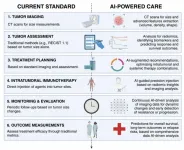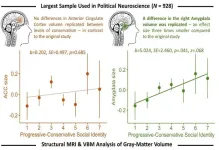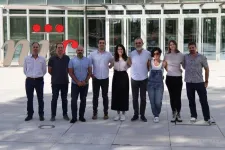(Press-News.org) Cooling in the subsurface waters beneath Greenland’s Nioghalvfjerdsfjorden Glacier (79NG) from 2018 to 2021 was driven by European atmospheric blocking, which forced changes in the large-scale ocean circulation of the Nordic seas, researchers report, slowing glacial melt, despite ongoing global warming trends. The findings highlight the importance of regional atmospheric dynamics in influencing glacier stability. Understanding these dynamics is key to predicting the future of glaciers like 79NG in a warming climate. The Greenland Ice Sheet has experienced accelerated mass loss in recent decades due to a warming atmosphere and ocean, significantly contributing to global sea-level rise. About half of this loss comes from increased ice discharge from marine-terminating glaciers like 79NG as they retreat and thin, a process predominantly driven by ocean warming, resulting in submarine melting. Since the late 1990s, ocean heat flux has increased, warming subsurface Atlantic Intermediate Water (AIW) that flows below the 79NG ice tongue, enhancing melt rates. However, from 2018 to 2021, direct observations at 79NG revealed a significant water cooling blow the glacier, which reduced ice melt and slowed glacier thinning. Rebecca McPherson and colleagues show that changes in large-scale atmospheric circulation drove this cooling event. McPherson et al. linked this cooling to increased atmospheric blocking, which disrupted normal weather patterns and funneled cold arctic air into the region. The ocean responded by losing more heat to the atmosphere, slowing Atlantic water circulation and cooling the water reaching 79NG. According to the authors, the cooling pattern resembles European blocking, a weather regime associated with a stationary high-pressure system over Europe. Although Atlantic water temperatures are likely to continue to rise with global climate warming, the projected slowdown of the Atlantic Meridional Overturning Circulation (AMOC) could also bring cooler waters to Northeast Greenland’s glaciers. “An improved understanding of the connection between the 79NG and the large-scale ocean and atmospheric circulation leads to further advances in our understanding of the response of the 79NG to changing ocean conditions,” McPherson et al. write.
END
Atmospheric blocking slows ocean-driven glacier melt in Greenland
Summary author: Walter Beckwith
2024-09-19
ELSE PRESS RELEASES FROM THIS DATE:
Study: Over nearly half a billion years, Earth’s global temperature has changed drastically, driven by carbon dioxide
2024-09-19
Published in the journal Science, the study presents a curve of global mean surface temperature that reveals Earth's temperature has varied more than previously thought over much of the Phanerozoic Eon a period of geologic time when life diversified, populated land and endured multiple mass extinctions. The curve also confirms Earth's temperature is strongly correlated to the amount of carbon dioxide in the atmosphere.
The start of the Phanerozoic Eon 540 million years ago is marked by the Cambrian ...
Clinical trial could move the needle in traumatic brain injury
2024-09-19
FOR IMMEDIATE RELEASE
Subscribe to UCSF News
Department of Defense-funded study aims to end a decades-long impasse in treatment development.
Traumatic brain injury (TBI) results in close to 70,000 deaths in the United States every year, and it is the cause of long-term physical, cognitive and mental disability in 5 million Americans. But despite three decades of work, treatments are sorely lacking.
Now, an innovative drug development trial will be available in emergency departments of 18 level 1 trauma sites nationwide. It is launched by UC San Francisco and the Transforming Research and Clinical Knowledge in Traumatic ...
AI model can reveal the structures of crystalline materials
2024-09-19
For more than 100 years, scientists have been using X-ray crystallography to determine the structure of crystalline materials such as metals, rocks, and ceramics.
This technique works best when the crystal is intact, but in many cases, scientists have only a powdered version of the material, which contains random fragments of the crystal. This makes it more challenging to piece together the overall structure.
MIT chemists have now come up with a new generative AI model that can make it much easier to determine the structures of these powdered crystals. The prediction model could help researchers characterize ...
MD Anderson Research Highlights for September 19, 2024
2024-09-19
HOUSTON ― The University of Texas MD Anderson Cancer Center’s Research Highlights showcases the latest breakthroughs in cancer care, research and prevention. These advances are made possible through seamless collaboration between MD Anderson’s world-leading clinicians and scientists, bringing discoveries from the lab to the clinic and back.
Genetic factors underscore disparities in colorectal cancer survival
Patients with colorectal cancer have varied overall survival, but it remains unclear how the frequency of certain gene mutations among different racial and ethnic groups influences outcomes. To investigate, researchers led by John Paul Shen, M.D., and ...
The role of artificial intelligence in advancing intratumoral immunotherapy
2024-09-19
“We explore how integrating these technologies could revolutionize personalized oncology.”
BUFFALO, NY- September 19, 2024 – A new editorial was published in Oncotarget's Volume 15 on September 17, 2024, entitled, “The emerging role of AI in enhancing intratumoral immunotherapy care.”
As highlighted in the abstract of this editorial, the emergence of immunotherapy (IO), and more recently, intratumoral IO, offers a novel approach to cancer treatment. This method enhances immune responses, allows for combination therapies, and helps reduce systemic adverse events. These techniques aim to ...
Political ideology is associated with differences in brain structure, but less than previously thought
2024-09-19
Conservative voters have slightly larger amygdalas than progressive voters—by about the size of a sesame seed. In a replication study publishing September 19 in the Cell Press journal iScience, researchers revisited the idea that progressive and conservative voters have identifiable differences in brain morphology, but with a 10x larger and more diverse sample size than the original study. Their results confirmed that the size of a person’s amygdala is associated with their political views but failed to find a consistent association between politics and the anterior cingulate cortex (ACC). Anatomical differences in both ...
Genetic tracing at the Huanan Seafood market further supports COVID animal origins
2024-09-19
A new international collaborative study provides a list of the wildlife species present at the market from which SARS-CoV-2, the virus responsible for the COVID-19 pandemic, most likely arose in late 2019. The study is based on a new analysis of metatranscriptomic data released by the Chinese Center for Disease Control and Prevention (CDC). The data come from more than 800 samples collected in and around the Huanan Seafood Wholesale market beginning on January 1, 2020, and from viral genomes reported from early COVID-19 patients. The research appears September 19 in the journal Cell.
“This is one of the most ...
Breastfeeding is crucial to shaping infant’s microbes and promoting lung health
2024-09-19
Human breast milk regulates a baby’s mix of microbes, or microbiome, during the infant’s first year of life. This in turn lowers the child’s risk of developing asthma, a new study shows.
Led by researchers at NYU Langone Health and the University of Manitoba, the study results showed that breastfeeding beyond three months supports the gradual maturation of the microbiome in the infant’s digestive system and nasal cavity, the upper part of the respiratory tract. Conversely, stopping breastfeeding earlier than three months disrupts the paced development of the microbiome and ...
Scientists at the CNIC discover an unexpected involvement of sodium transport in mitochondrial energy generation
2024-09-19
The GENOXPHOS (Functional Genetics of the Oxidative Phosphorylation System) group at the Centro Nacional de Investigaciones Cardiovasculares (CNIC) has discovered a crucial role of sodium in the generation of cellular energy. The study, led by GENOPHOS group leader Dr. José Antonio Enríquez, also involved the participation of scientists from the Complutense University of Madrid, the Biomedical Research Institute at Hospital Doce de Octubre, the David Geffen School of Medicine at UCLA, and the Spanish research networks on frailty and healthy aging (CIBERFES) ...
Origami paper sensors could help early detection of infectious diseases in new simple, low-cost test
2024-09-19
Researchers at Cranfield University have developed an innovative new method for identifying biomarkers in wastewater using origami-paper sensors, enabling the tracking of infectious diseases using the camera in a mobile phone. The new test device is low-cost and fast and could dramatically change how public health measures are directed in any future pandemics.
Wastewater a key way to track infections
Testing wastewater is one of the primary ways to assess the prevalence of infectious diseases in populations. Researchers take samples from various ...
LAST 30 PRESS RELEASES:
How can you rescue a “kidnapped” robot? A new AI system helps the robot regain its sense of location in dynamic, ever-changing environments
Brainwaves of mothers and children synchronize when playing together – even in an acquired language
A holiday to better recovery
Cal Poly’s fifth Climate Solutions Now conference to take place Feb. 23-27
Mask-wearing during COVID-19 linked to reduced air pollution–triggered heart attack risk in Japan
Achieving cross-coupling reactions of fatty amide reduction radicals via iridium-photorelay catalysis and other strategies
Shorter may be sweeter: Study finds 15-second health ads can curb junk food cravings
Family relationships identified in Stone Age graves on Gotland
Effectiveness of exercise to ease osteoarthritis symptoms likely minimal and transient
Cost of copper must rise double to meet basic copper needs
A gel for wounds that won’t heal
Iron, carbon, and the art of toxic cleanup
Organic soil amendments work together to help sandy soils hold water longer, study finds
Hidden carbon in mangrove soils may play a larger role in climate regulation than previously thought
Weight-loss wonder pills prompt scrutiny of key ingredient
Nonprofit leader Diane Dodge to receive 2026 Penn Nursing Renfield Foundation Award for Global Women’s Health
Maternal smoking during pregnancy may be linked to higher blood pressure in children, NIH study finds
New Lund model aims to shorten the path to life-saving cell and gene therapies
Researchers create ultra-stretchable, liquid-repellent materials via laser ablation
Combining AI with OCT shows potential for detecting lipid-rich plaques in coronary arteries
SeaCast revolutionizes Mediterranean Sea forecasting with AI-powered speed and accuracy
JMIR Publications’ JMIR Bioinformatics and Biotechnology invites submissions on Bridging Data, AI, and Innovation to Transform Health
Honey bees navigate more precisely than previously thought
Air pollution may directly contribute to Alzheimer’s disease
Study finds early imaging after pediatric UTIs may do more harm than good
UC San Diego Health joins national research for maternal-fetal care
New biomarker predicts chemotherapy response in triple-negative breast cancer
Treatment algorithms featured in Brain Trauma Foundation’s update of guidelines for care of patients with penetrating traumatic brain injury
Over 40% of musicians experience tinnitus; hearing loss and hyperacusis also significantly elevated
Artificial intelligence predicts colorectal cancer risk in ulcerative colitis patients
[Press-News.org] Atmospheric blocking slows ocean-driven glacier melt in GreenlandSummary author: Walter Beckwith





